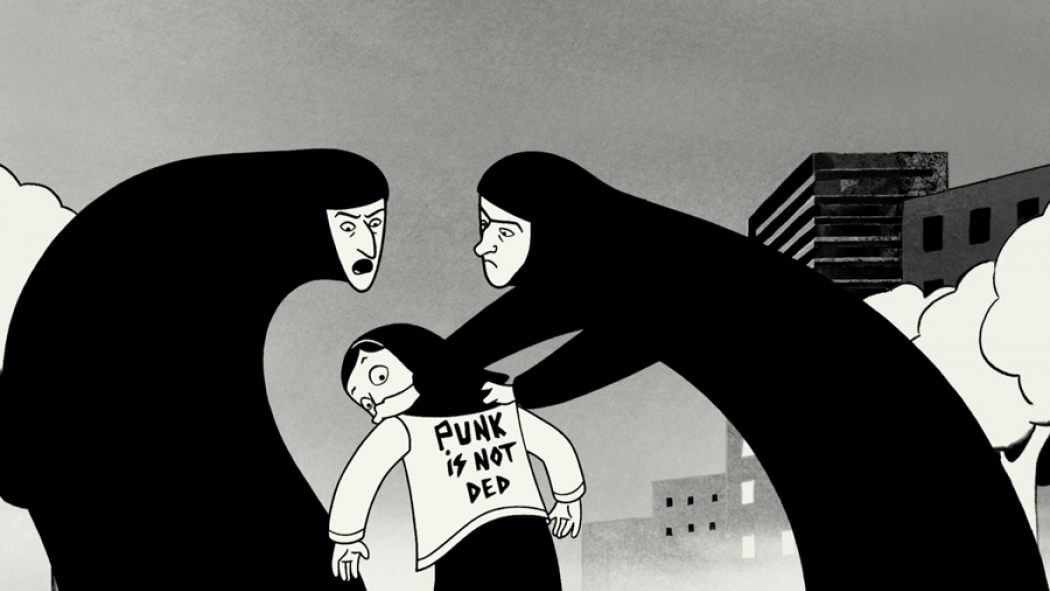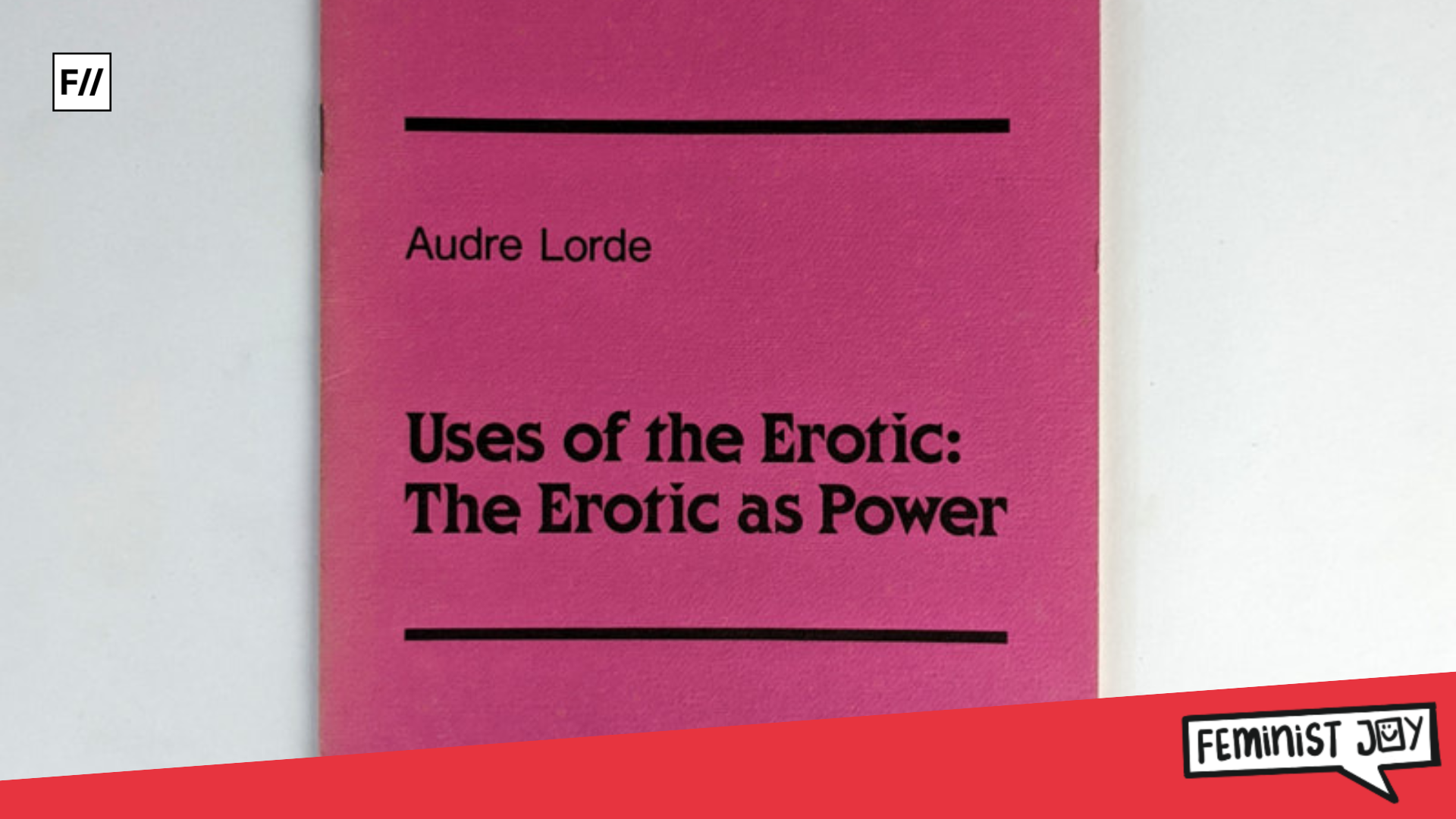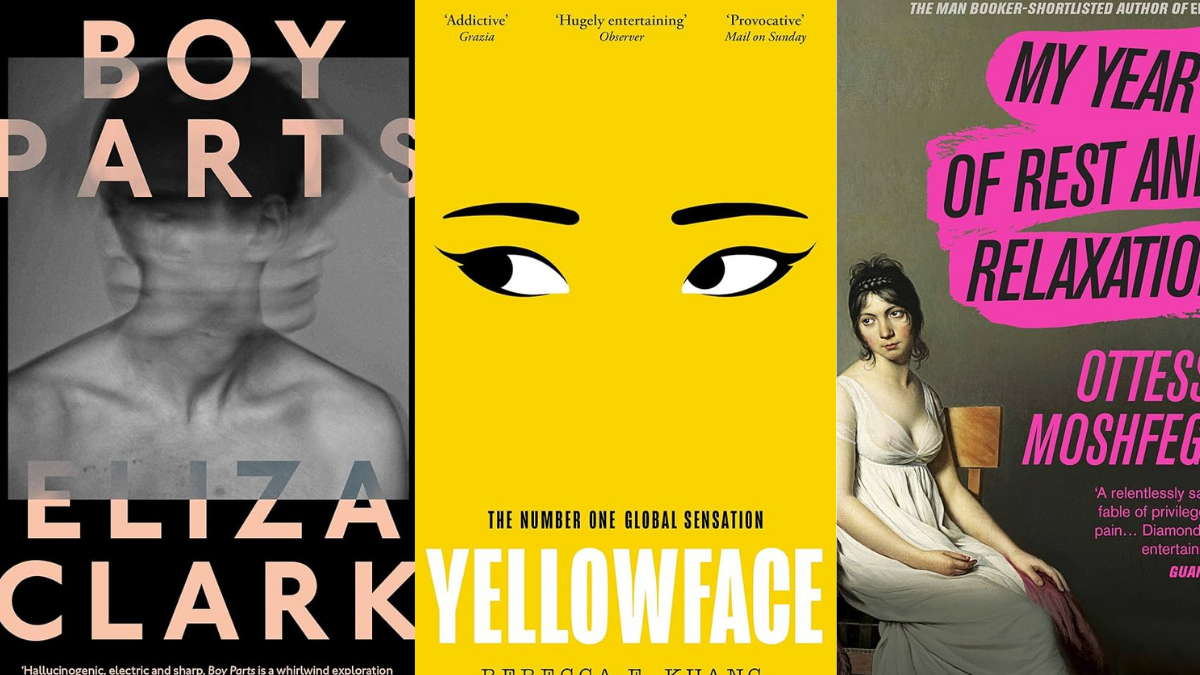The gender politics within the context of the warring ideologies of conservatism and progression is explored with nuance in Persepolis. It is a coming of age story set in the middle east with the war of the political ideologies as the background. The backdrop of this graphic novel is the Islamic Revolution in Iran.
I am not equipped to write a detailed review of this graphic novel and explore all the complexities involved and do justice to it. Persepolis gives a detailed exploration of neo-colonisation and white supremacy, the conflation of modernism with westernism, and people in countries with a largely conservative ideology looking to the west and romanticizing ‘modern values’.
And the alienation that one feels when denied selfhood by their own country. As well as the alienation one feels when denied selfhood by the west which advertises itself as an alternative.
But who I can write about is author Marjane Satrapi, and her all too familiar coming of age story. This in a context where women’s bodies are controlled and they grow up romanticizing the values in the west, thinking of it as an effective form of solace.
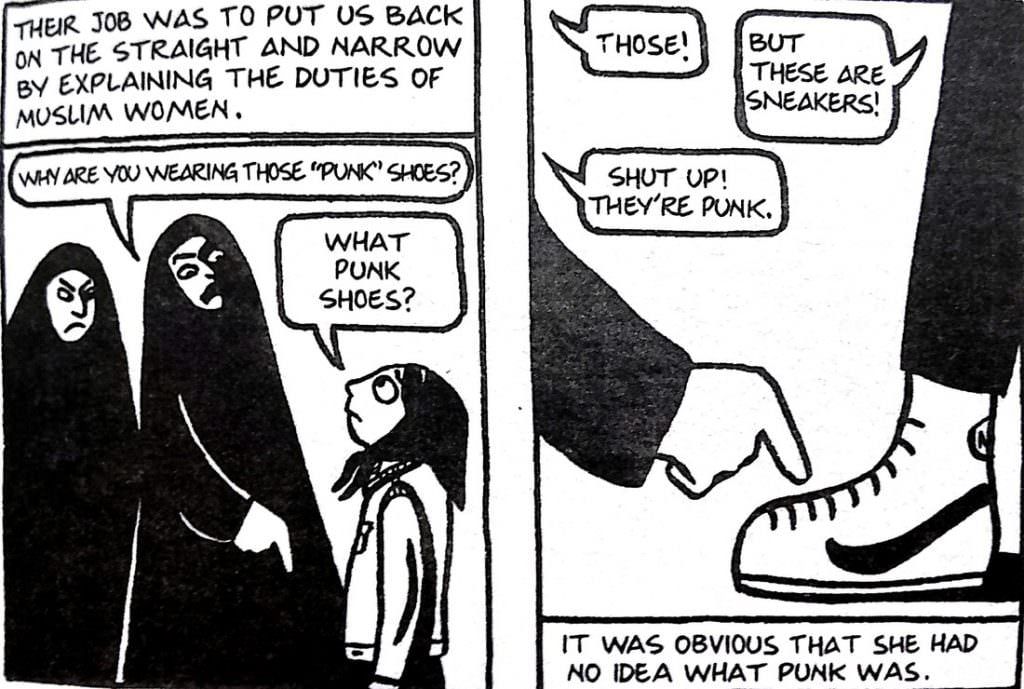
Image Credit: The Amateur Media Blog
I am not living in a war zone, I cannot conflate my experience with a woman’s experience whose clothes are compulsorily monitored and she does not have the agency to as much as put posters of her favourite bands in her bedroom. But I can empathize because living in a society that prescribes to patriarchy in several forms does tend to familiarize you with the way it operates, even if the intensity differs.
In their school in Tehran, from a very young age, they are initiated into a conservative society which starts asserting their right over their bodies even before they have shown any visible signs of puberty. The girls are to wear veils, and it was not optional. The veil, in this particular instance, is oppressive. It is not a choice, and Marjane condemns this.
As Marjane details the oppression of the regime, she questions the idea of self-preservation and standing for your principles, and how a lot of times they both are mutually exclusive. Is someone to stand by their principles even if it puts their life in danger? That sounds romantic in theory, and it sounds romantic as an abstract idea.
In practice, engaging in protests in an oppressive regime means being silenced, and have your speech and articulations controlled by the regime. It’s never as grandiose and romantic as it sounds. People generally have a singular idea what happens when people engage in protests, and that’s probably because of a very simplified representation in pop culture. Putting your life in danger for your beliefs sometimes can be the most unromantic thing there is, as detailed in the book and reiterated several times.
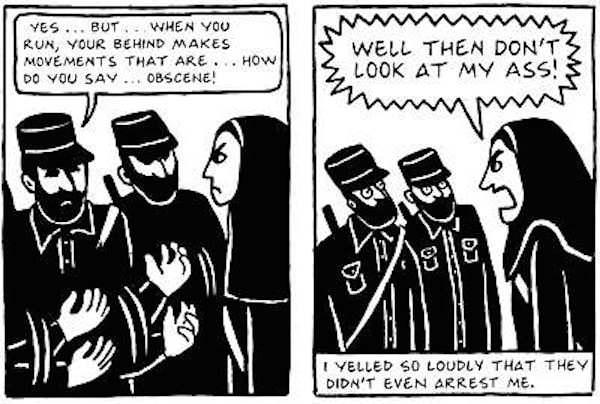
Image Credit: Twitter
But, coming back to the veil, the realization of the significance of the veil entails her disdain of the oppressive regime which asserts agency over her body. As well as the western culture which seduces by advertising itself as an alternative, while not being a viable alternative.
Marjane’s relationship with the veil is complicated because she was denied a choice. She is sent to Austria by her parents who consider her safety paramount. The general expectation was that Austria would be more liberating, and the riddance of the compulsory veil would give her more breathing space.
Also Read: Book Review: Good Night Stories For Rebel Girls
Coming from a war zone, Marjane did not realize she would ever be inadequate to deal with the culture shock she experiences and the overt instances of racism that she would have to endure.
Part of the reason for that sort of inadequacy comes from the fact that the west largely establishes itself as the norm and advertises itself as a Utopian space that encourages diversity. West has established itself as modern. One comes out thinking that prescribing to a western ideology would be enough to be considered a part of it.

Image Credit: Serendipity Studio
In France, a year back a woman was made to remove her Burkini because France discourages public display of religion. The move was largely condemned by the international press who thought of it as discriminatory and insensitive, and a word that was thrown around was liberal fascism.
My point of bringing up that particular incident is, even though I cannot generalize but the west is culpable of feeding a narrative that vilifies the middle-east and appeals to its white saviour complex, without anything to give substance to the latter and a misconstrued representation of the former.
Marjane was not prepared to feel the alienation which she would be subjugated to when she was in Austria. She had nothing to prepare her for it.
Most of the instances she details of her time in Austria are instances that question her place in their society. Marjane is repeatedly made to feel unworthy. The xenophobia in Austria and the oppressive regime in Iran lead to a serious identity crisis for Marjane.

Image Credit: Dundee comics
On her way back from Austria to Iran, she wears her veil. Her subsequent feelings after the act of wearing the veil were not of oppression, but a strange sense of liberation. It was true that Iran at the moment denied them a choice, but it was still her country, and she thought that moment to be empowering because she chose to belong with her country and all the baggage that came with it.
Marjane details her sense of alienation within her own country when she comes back to Iran. The progressive and conservative politics within her own country and between the middle east and the west leave Marjane with an identity crisis she does not know how to go about. She wants to be true to herself, but that means being alienated from a community-based experience.
There are a lot of things I haven’t gone into in this review, I haven’t gone into Marjane’s admirable defiance against authorities who tried to strip off her individual autonomy, Marjane questions the right of the state and society to deny her the right to be a certain way at every point. The essence of Persepolis is navigating gender politics given the context of the politics in Iran and the world politics, which the novel remarkably explores.
The novel ends with the reconciliation of her national identity and her individual autonomy, and her leaving for France to go Grad school. There are no promises of happily ever after, but sometimes reconciliation with turmoil is the best thing that one can ask for.
Also Read: Reviewing The Riot Grrrl Collection: Feminist Movement From The 90s
Featured Image Credit: Drafthouse
About the author(s)
Holden Caulfield thinks you are a phony.
